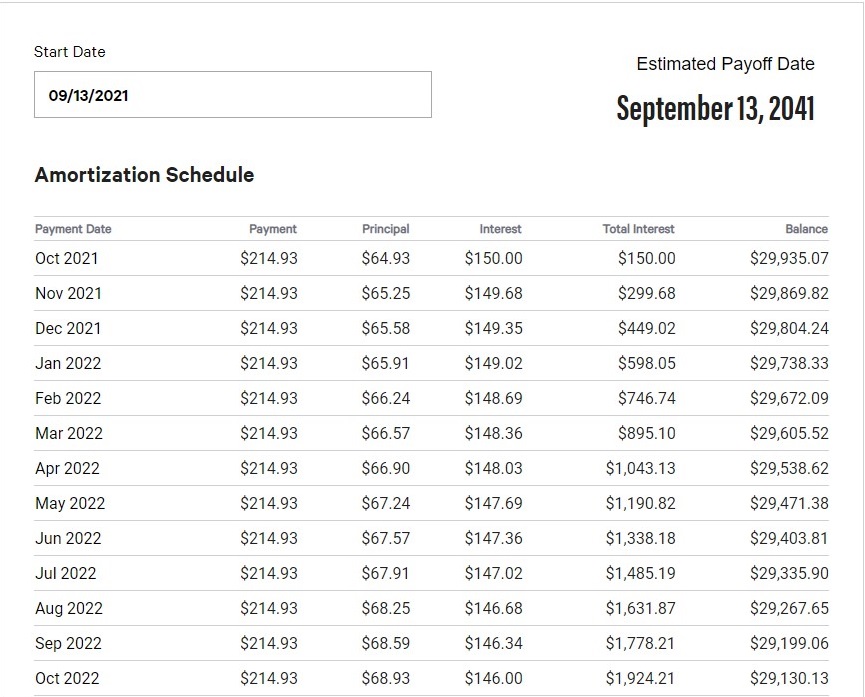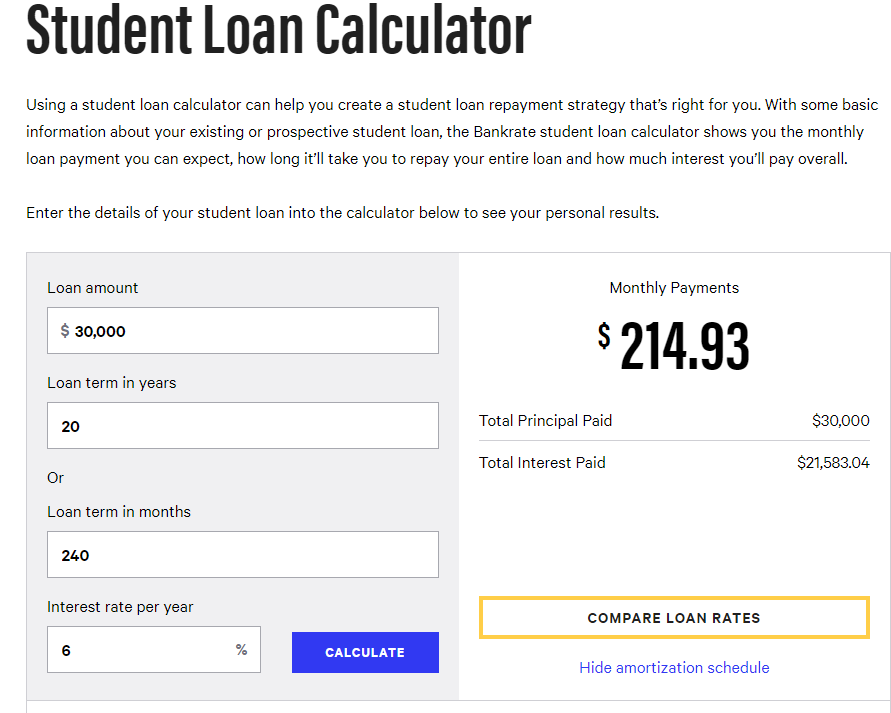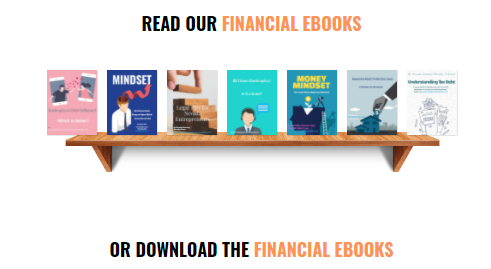

IDR or Income-Driven Repayment Plans
The traditional way to repay a student loan is by making monthly payments when you stop attending school.






The traditional way to pay a student loan is the same as paying a vehicle loan. Your contract sets out your loan terms, with five vital terms -
-
1The loan balance
-
2The interest rate
-
3The payment required
-
4The term or number of monthly payments required, and
-
5When your first payment is due



-
If you attended school for less than 4 years, you probably have a ten-year repayment term. If you attended school for 4 years, most loans might require repayment over twenty years. If you attended school beyond 4 years, your loan term could last up to thirty years.
With traditional repayment, as with most consumer loans, your interest and principal costs are amortized. With amortized loans, payments are applied to interest costs first. As time passes, more of your payment goes to repaying principal while less goes to pay interest. Often you will pay almost as much towards interest as you pay to your principal balance.



However, with federal student loans, other options are often more economical. For many people, we recommend one of the income-driven repayment plans
In any income-driven repayment program, the amount you earn determines what you will pay. So instead of paying off your loan in dollars, you commit to paying for a specified time. Of course, your payments can increase as your income increases. But if your income goes down, you could also pay a smaller amount. But notwithstanding that you are making smaller payments, your payment won’t increase above the size of the traditional payment.
Once you satisfy all program conditions, the government declares that your loan is satisfied and fully repaid. Any remaining balance is “forgiven.”
And, if you enroll in the wrong program, you might not realize it until after paying for many years. Anyone can make a mistake. In addition, when selecting a program, you may need to predict your future. Even intelligent and well-educated people may not have a crystal ball or psychic powers. And regrettably, advice from the customer service representatives working for the student loan company can complicate this problem.
The US Department of Education website states you shouldn’t pay for help with your student loans because they will help you for free. However, their interests are not aligned with what is best for you. And the staff they have available to discuss your situation lack the education and insight to understand your problems. Unfortunately, many people have discovered that their help harms rather than helps. When you have a lot of money at stake in student loan debt, you must decide whether professional advice is worth its cost.
Choosing the wrong program could result in you not receiving debt forgiveness. Instead, and regrettably, you may not discover your mistake for years. Unfortunately, in most instances, government programs do not offer a “do-over” if a government representative gave you the wrong advice.
Either you are good, or you are out. The following are typical reasons why an income-driven repayment program might fail:
- Not qualifying for the program.
- Not updating income information consistently as required.
- Not making every payment “on time.”




No one can deny that these programs offer substantial benefits. A large portion of your student loan can disappear when you complete an income-driven program. But this will only happen if you enroll in the right program and complete the strict conditions.
In addition, deferment or forbearance extends the length (or term) of time to repay your loan. Thus, in a deferment or forbearance program, you have wasted valuable time because both deferment and forbearance extend the length of your loan.
How do these programs work?
In an income-driven repayment program, your loan term is for a fixed length of time (the term). For example, it might be for 120 months, 240 months, 300 months, or even longer. However, the size of your payment can change depending on what you earn. It could increase, or it could go down. Other factors will affect how much you must pay each month.
After leaving school, many people don’t earn much. During this time, these people could benefit from a small and affordable student loan payment. Even several years after their education ends, some people still don’t earn much. However, these people also continue to benefit from a modest loan payment.
In an income-driven repayment program, the amount you earn determines the amount you pay. The size of your loan is irrelevant.
In an income-driven repayment program, someone earning less than $30,000 a year could have a monthly payment between $0 and $150. If their income increases, their payments will go up. But in these programs, their payments never increase above the payment under a traditional program.
Income-driven repayment programs consistently result in savings. In addition, after completing the loan term, these programs provide total forgiveness of the loan balance.
By choosing a deferment or forbearance program, while you do pay nothing, your loan balance increases every month. The size of this increase can be substantial.
Many people choose deferment or forbearance because the student loan creditor recommends this option anytime someone says they “can’t afford to pay.” But that is precisely when an income-driven repayment program will benefit you the most.
The three benefits to choosing an income-driven repayment program while your income is low are:
- Your payments are small.
- By paying on your student loan, your credit report will improve.
- Years will come off your repayment term.
Does it make sense to increase your debt when you could significantly reduce it by paying less than $4 a day? Enrolling in an income-driven repayment while your income is small allows you to take years off your repayment term.
Some people will qualify for a $0 monthly payment after leaving school. And if their income never increases, the result could be that they might pay nothing on their student loans. Nominal payments can continue if someone is disabled, chooses not to work, obtains limited or part-time employment, or enters a career that doesn’t provide much income.
This information is important, so let's repeat it.
In an income-driven repayment program, you make a set NUMBER of payments. The number of payments or length of time is your loan term. You are not repaying the loan balance. You are only making payments over a set term.
Therefore, the amount of your payment is irrelevant. Making even a modest payment of $100 per month (or less) counts just as much to satisfy the term requirement as making a larger payment.
The number of years you went to school determines the length of your repayment obligation. The number of payments is usually 20 years for 4 years of education, 25 years for 6 years of education, and 30 years for more than 6 years of education.



